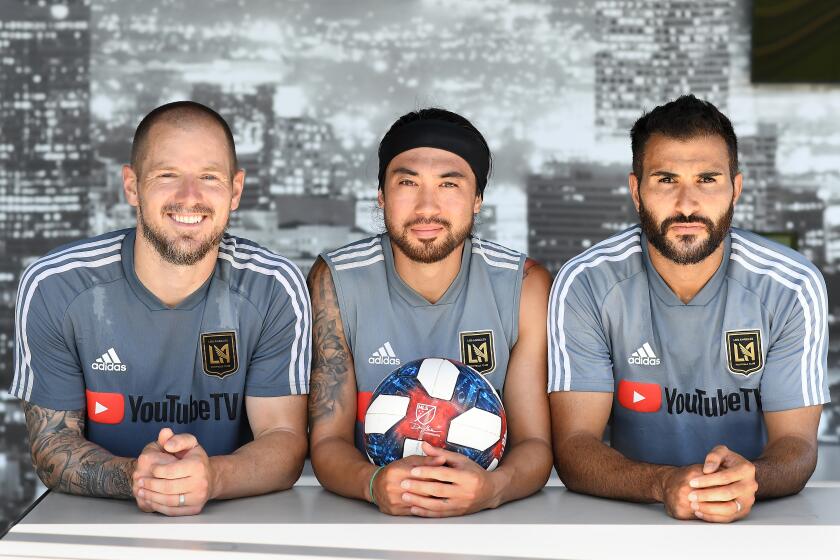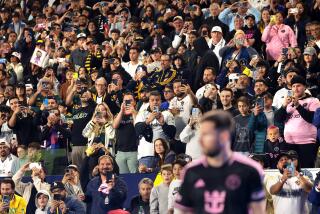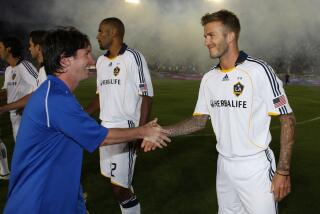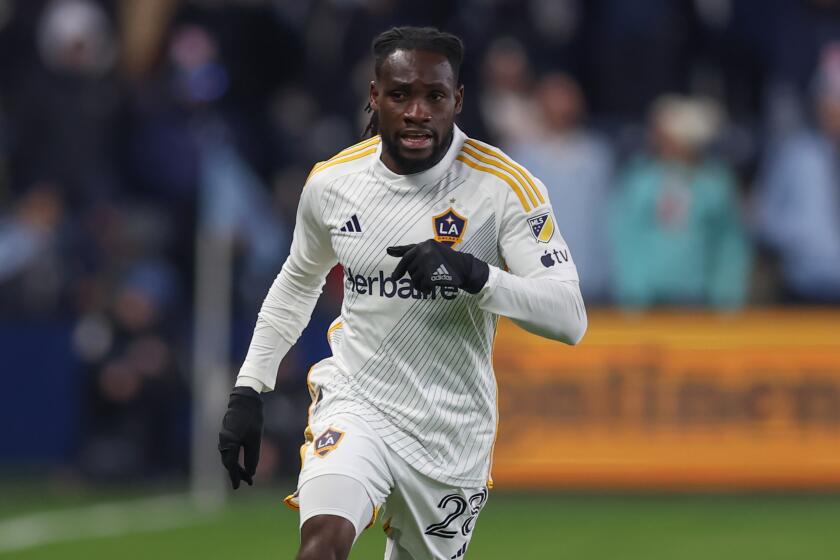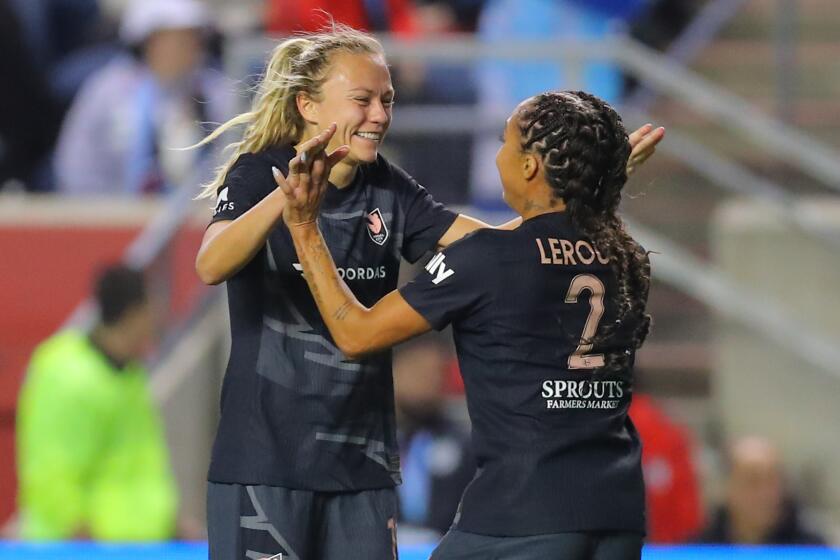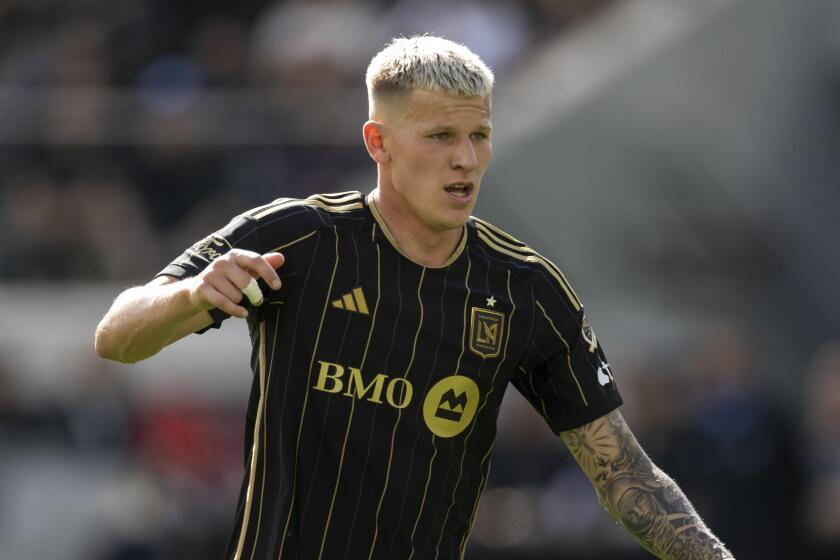Column: Espanyol, the other Barcelona club, is secure in its future
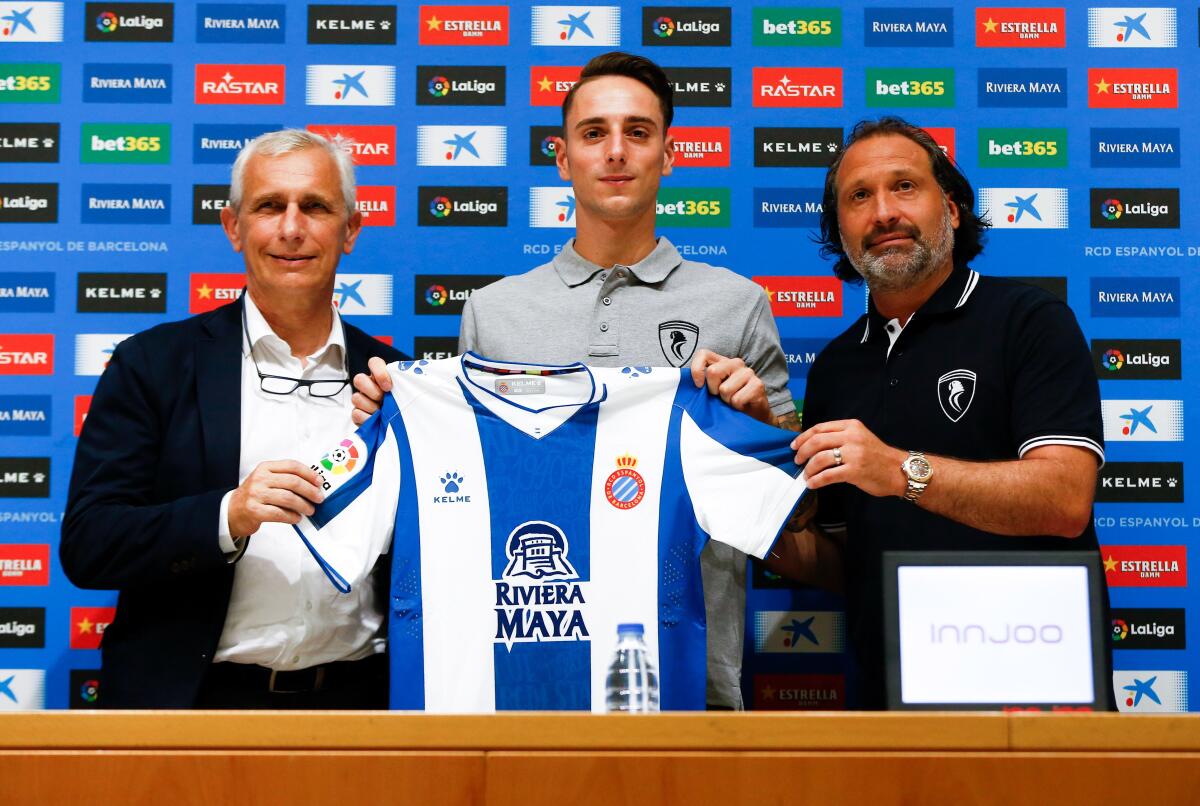
Carlos Garcia Pont has heard the question before. Dozens of times.
Yet when asked again during a recent phone interview what it’s like to run a soccer team in Barcelona, his immediate response was laughter. Clearly it helps to have a sense of humor when you’re the vice president of a club that shares a city with one of the richest and most successful teams in history.
“That’s a great view of life, right?” Garcia Pont eventually answered. “Why should anyone be a fan of the second club in Barcelona?”
The first club in Barcelona is … well, Barcelona. The second club, Garcia Pont’s club, is Espanyol.
You’ve heard of the first one; the second one, probably not.
Barcelona, the team of Lionel Messi, Luis Suarez and now Antoine Griezmann, has won a record 74 trophies, including 26 Spanish titles and five Champions League crowns, although it opened the new season Friday with a 1-0 loss to Athletic Club.
Espanyol, a founding member of La Liga, will kick off its 81st season in the first division Sunday still looking for its first championship.
Barcelona packs it 100,000-seat stadium, the largest venue in Europe. Espanyol averaged 19,064 last season at its 40,500-seat stadium, where it has never played to a sellout.
Barcelona, the second-richest team in the world, spent $136 million on Griezmann’s transfer fee alone this summer. That’s $110 million more than Espanyol spent on its entire roster last season.
“Living with a team like Barcelona is difficult,” said Espanyol captain David Lopez, sitting in a conference room at the team’s training center in suburban Barcelona. “It moves masses — not only here in Catalonia and Spain, but around the world.”
Sign up for our free soccer newsletter >>
That can make traveling tedious when people learn you’re a soccer player from Barcelona.
“The first things people say are ‘Messi’ and ‘Barca.’ They are the first two words,” said Lopez, who is sidelined until September because of a knee injury. “And I understand perfectly.”
Lopez understands because he grew up in a family of long-suffering Espanyol supporters, entered the club’s academy as a teenager and has never known a time when the two teams were close to equal. Garcia Pont, who has a PhD in management philosophy from MIT, isn’t as accepting.
“We have our own personality and we don’t have to compete against Barcelona,” he said. “They have played a game in terms of developing a certain identity. We don’t want to have that identity.
“We are the club in Barcelona that is less massive. We are the team of the people from Barcelona. We are not going to be the contra-Barcelona team. We don’t need to be that.”
In many ways they are.
While Barca’s culture leans heavily on its history, the clubs were founded just 11 months apart, straddling the end of the 19th century and the start of the 20th. While Barca has framed its identity in Catalan nationalism — the region’s flag is represented in the club’s crest — it was founded by a group of foreigners while Espanyol was the first club formed by Spaniards, started by a group of university students.
“History makes a good point,” Garcia Pont said. “Espanyol [was] the Spanish club in Barcelona.”
For nearly eight decades the teams divided the city, equals if not always equivalent.
“Up until the ’60s or ’70s both clubs were kind of similar,” Garcia Pont said. “And FC Barcelona took off for different reasons.”
Several members on the LAFC squad are growing out their beards for the rest of the season until they win their first playoff match.
The biggest reason was TV revenue. Until recently Spanish teams were able to negotiate individual broadcast deals, with Barcelona and Real Madrid raking in 19 times as much as the smaller clubs in the top division, more than 10 times the difference in other top European leagues.
As a result, the spending gap between the top two teams in Spain has become unbridgeable. Barcelona spent $1.079 billion last season; Garcia Pont said Espanyol’s budget was $35 million. And that difference has shown on the field, where Espanyol’s seventh-place finish was its best in 14 seasons. Barcelona has finished lower than second just once since 2003 and hasn’t gone more than two years without a championship in that span.
Since 2004, only three clubs have won the league title.
“La Liga is not designed like the NBA, where anybody can win. La Liga is a self-fulfilling prophecy,” Garcia Pont said. “It’s only Barcelona and Real Madrid who can win La Liga. And then Atletico Madrid, from time to time, might make a miracle.” Espanyol’s budget ranks in the middle of the 20-team league. To be competitive, Garcia Pont estimated, would take an additional $100 million.
“And that’s almost impossible to get,” he said.
Especially for a team that was nearing bankruptcy when Chinese businessman Chen Yansheng took over ownership in 2016, paying down the team’s growing debts and promising to qualify the team for the Champions League.
He might be getting close to fulfilling that pledge, with last season’s seventh-place finish winning Espanyol a spot in Europa League qualifying. It’s not quite the Champions League but it’s Espanyol’s first continental competition since 2007.
In the meanwhile some, including Lopez, find comfort in the fact they’re playing in Barcelona without having to be Barcelona.
“The players live in a very beautiful city with a spectacular climate, very good food, schools. They are in a very good environment,” said Lopez, who signed a five-year contract extension last season. “I see it as a positive part.
“You can be in a big city playing in the first division and also enjoy the city. Football players are very well-known, and there are times when you want to be alone with your family.”
Let’s see Leo Messi try that.

